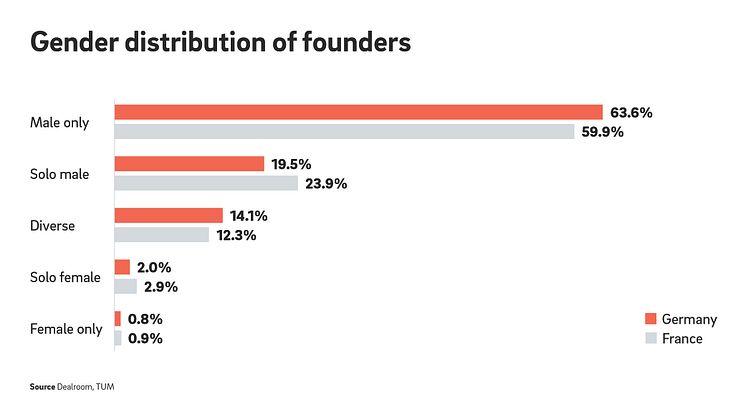
Press release -
Study reveals extent of gender inequality in start-up landscape - Start-ups dominated by men
Munich, November 2022: Women are significantly underrepresented in German and French start-ups, especially in technical industries. This applies to both founders and employees, as a study from the Technical University of Munich (TUM) in collaboration with the Roland Berger Foundation for European Management now shows. In companies founded by all-female teams, the proportion of women in the workforce is almost twice as high as in male-established ventures. Start-ups launched by men also have a much higher valuation.
Similar to mature companies, start-ups are increasingly shining the spotlight on the importance of gender equality. However, unlike in larger enterprises, the level of diversity in start-ups has not been explored in much detail to date. With this in mind, a research team from TUM, supported by the Roland Berger Foundation for European Management, set about analyzing roughly 700 German and 1,000 French start-ups. To ensure comparability, the researchers focused on companies that had received seed funding between 2012 and 2016. They analyzed information from the database Dealroom and matched it with data shared by around 80,000 start-up employees on LinkedIn.
The analysis shows that only around 3 percent of the German and 4 percent of the French start-ups surveyed were founded by all-female teams or solo female founders. Around 83 percent of German and 84 percent of French companies were founded by men, while 14 and 12 percent, respectively, were launched by mixed teams. Exceeding 60 percent, the proportion of male employees is also significantly higher in both countries. It is striking that all-female founding teams have 62 percent female employees, while in start-ups founded by male teams that figure is just 35 percent.
Women particularly underrepresented in tech industry
The research team also investigated how the gender divide breaks down across industries. In Germany, the proportion of female founders is comparatively high in the dating industry (50%) and in fashion (29%). However, there are hardly any female founders in robotics or real estate (3% each), for instance. The picture is similar in France. Here, female founders are most strongly represented in the wellness and beauty industry (25%), but are rare in markets such as fintech (5%).
Looking at employee figures, the analysis also shows that women are strongly underrepresented in technology industries. Of the sectors surveyed, the computer games industry in Germany (19%) and the semiconductor industry in France (17%) were among those with the lowest proportions of women.
Zero female founders in quantum technology
Similar to the analysis about start-up industries as defined by the product, the study also analyzed the gender distribution according to the technologies that start-ups use. In Germany, women most frequently founded start-ups using virtual reality (20%). Ventures using technologies for the Internet of Things were very rarely launched by women (3%). Meanwhile, in the quantum technology sector no female founders at all could be found – as it was also the case in France. In that country, the share of female founders was highest in start-ups using nanotech (14%).
Male-established start-ups have much higher valuation
Across both countries, valuations by investors are also marked by inequality. While male-led German start-ups are valued at a median of 21 million US dollars, start-ups with all-female founder teams are at around 6 million dollars. In France, male-established start-ups are valued at a median of 14 million dollars, compared with 4 million dollars for female-led ventures.
Increasing gender parity in start-up and investment processes
“Women are significantly underrepresented in the start-up space, both as founders and as employees – across all industries, technologies and revenue models,” says study leader Dr. Theresa Treffers of TUM’s Chair of Strategy and Organization. “If we look at studies in social psychology, we can see what drives this lack of gender diversity. Investors have the perception that men are better suited to entrepreneurial roles. And we are missing female students in STEM subjects – in other words, subjects that would likely be the springboard for future founders and start-up employees. Women only make up around 30 percent of STEM students.”
The study recommends several measures for a more diverse and inclusive start-up landscape. “The most important thing is to combat gender bias and stereotypes, for instance by promoting female role models at an early stage,” explains Felicitas Schneider, member of the Management Board of the Roland Berger Foundation for European Management. “Targeted support needs to be available for female founders, since women hire more women.” The study also sees room for improvement in founding and investment processes, for example through gender-neutral start-up programs and a higher proportion of women in management positions at venture capital firms.
Topics
About the Roland Berger Foundation for European Management:
The Roland Berger Foundation for European Management promotes scientific research in the field of national and international corporate management.
About the Technical University of Munich:
The Technical University of Munich (TUM) is one of Europe’s leading research universities, with more than 600 professors, 50,000 students, and 11,000 academic and non-academic staff. Its focus areas are the engineering sciences, natural sciences, life sciences and medicine, combined with economic and social sciences. TUM acts as an entrepreneurial university that promotes talents and creates value for society. In that it profits from having strong partners in science and industry. It is represented worldwide with the TUM Asia campus in Singapore as well as offices in Beijing, Brussels, Mumbai, San Francisco, and São Paulo. Nobel Prize winners and inventors such as Rudolf Diesel, Carl von Linde, and Rudolf Mößbauer have done research at TUM. In 2006, 2012, and 2019 it won recognition as a German "Excellence University." In international rankings, TUM regularly places among the best universities in Germany.




